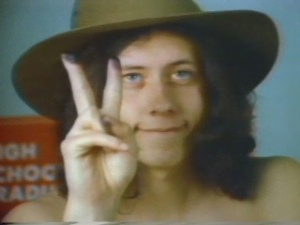March 15, 2024 —– Chart #237
Hello Music Friends,
Hey folks, welcome to another edition of Chart of the Week. This week we are in the 60’s with another Vietnam era tune. Unlike nearly all of the tunes I feature in this blog, today’s song cannot be reduced to one page. And it’s more of a funny story than a song, but I know you will like it. “Alice’s Restaurant Massacree“, commonly known as “Alice’s Restaurant“, is a satirical talking blues song by singer-songwriter Arlo Guthrie, released as the title track to his 1967 debut album Alice’s Restaurant. The song is a deadpan protest against the Vietnam War draft, in the form of a comically exaggerated but largely true story from Guthrie’s own life: while visiting acquaintances in Stockbridge, Massachusetts, he is arrested and convicted of dumping trash illegally, which later endangers his suitability for the military draft. The title refers to a restaurant owned by one of Guthrie’s friends, artist Alice Brock. Although Brock is a minor character in the story, the restaurant plays no role in it aside from being the subject of the chorus and the impetus for Guthrie’s visit.
The song inspired the 1969 film Alice’s Restaurant, which starred Guthrie and took numerous liberties with the story. The work has become Guthrie’s signature song and he has periodically re-released it with updated lyrics.
The song consists of a protracted spoken monologue, with a constantly repeated fingerstyle Piedmont blues ragtime guitar backing and light brush-on-snare drum percussion. This is bookended by a short chorus about the titular diner. Guthrie has used the brief “Alice’s Restaurant” bookends and guitar backing for other monologues bearing the Alice’s Restaurant name.
The track lasts 18 minutes and 34 seconds, occupying the entire A-side of the Alice’s Restaurant album. Due to Guthrie’s rambling and circuitous telling with unimportant details, it has been described as a shaggy dog story. Guthrie refers to the incident as a “massacree”, a colloquialism originating in the Ozark Mountains that describes “an event so wildly and improbably and baroquely messed up that the results are almost impossible to believe”. It is a corruption of the word massacre, but carries a much lighter and more sarcastic connotation, rather than describing anything involving actual death.
Guthrie recounts events that took place in 1965 (two years prior to the time of the original recording), when he and a friend spent Thanksgiving Day at a deconsecrated church on the outskirts of Stockbridge, Massachusetts, which their friends Alice and Ray Brock had been using as a home. As a favor to them, Guthrie and the friend volunteered to take their large accumulation of garbage to the local dump in their VW Microbus, not realizing until they arrived there that the dump would be closed for the holiday. They eventually noticed another pile of trash that had previously been dumped off a cliff near a side road, and added theirs to the accumulation before returning to the church for Thanksgiving dinner.
The next morning, the church received a phone call from the local policeman, Officer Obie, saying that an envelope in the garbage pile had been traced back to them. Guthrie, stating “I cannot tell a lie” and with tongue in cheek, confessed that he “put that envelope underneath” the garbage. He and his friend drove to the police station, expecting a verbal reprimand and to be required to clean up the garbage, but they were instead arrested, handcuffed, and taken to the scene of the crime. There, Obie and a crew of police officers from the surrounding areas collected extensive forensic evidence of the litter, including “twenty-seven 8-by-10 color glossy pictures with circles and arrows and a paragraph on the back of each one explaining what each one was, to be used as evidence against us” amid a media circus of local media trying to get news stories on the littering. The young men were briefly jailed, with Obie taking drastic precautions to prevent Guthrie from escaping or committing suicide. After a few hours, Alice bailed them out and held another Thanksgiving dinner.

Guthrie and his friend stood trial the next day. When Obie saw that the judge relied upon a seeing-eye dog, he realized that the officers’ meticulous work had been foiled by a literal “case of American blind justice”, as the judge would not be able to see the evidence. Guthrie and his friend paid a $50 fine to the court and were ordered to pick up the garbage, in the snow.
Well, I’m not going to tell you the entire story, it’s more fun to listen to the song. In case you don’t remember, it’s a long song so sit down and allow yourself 18 minutes of “me time” for this one.
Keep Rockin’,
Stan Bradshaw
